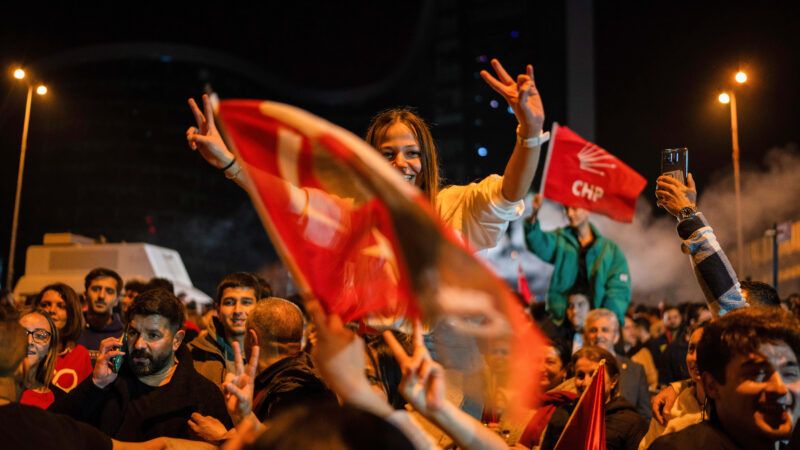Turkey's Strongman Had a No Good, Very Bad Weekend
The Turkish opposition ran circles around President Recep Tayyib Erdogan's party in local elections. It could be the beginning of the end of his 20-year reign.

All politics are local politics, the saying goes. And Turkey's local elections, held this weekend, were a very good sign for the opposition to President Recep Tayyib Erdogan. Despite a very slanted playing field, opposition parties managed to outcompete Erdogan's conservative Justice and Development Party (AKP) nationwide for the first time in over two decades.
The AKP's loss was something of a surprise. During last year's presidential elections, Erdogan had managed to eke out another four-year term. This time around, Turkish voters clearly rejected AKP rule—which has been marked by censorship, mass purges of political opposition, anti-immigrant fearmongering, and a hefty dose of religious nationalism.
"Unfortunately, we did not achieve the result we hoped for," Erdogan said in a speech conceding the results. He offered his supporters a consolation prize, insisting that "March 31 is not an end for us; it is actually a turning point" and "the real winner of this election is, first of all, our democracy."
The liberal Republican People's Party (CHP) won the largest number of votes nationwide with a 37.76 percent plurality and flipped eight AKP-held provinces to the CHP. The Kurdish leftist Peoples' Equality and Democracy Party (DEM) also made steady gains, despite reported attempts to suppress the Kurdish vote. In past years, the AKP has simply canceled local election results in Kurdish towns and appointed "trustee" mayors by fiat.
Istanbul Mayor Ekrem Imamoglu, a CHP politician who handily won reelection, was particularly happy about the results. (After Imamoglu had won his seat in 2019, the AKP government forced a do-over election, which Imamoglu won by an even larger margin.) "Those who do not understand the nation's message will eventually lose," Imamoglu gloated on Sunday.
This weekend's elections also show the potential breakup of the Turkish conservative coalition. Several new parties have tried to capture Erdogan's supporters over the past few years, including the secular nationalist Good Party (IYI) founded in 2017 and the religious nationalist New Welfare Party (YRP) founded in 2018.
The YRP had lined up behind Erdogan in the presidential elections last year, while the IYI stood with the opposition. Both managed to flip provinces away from the AKP this year. To some extent, Erdogan's rivals outflanked him on his Islamic nationalist message. While Erdogan has long tried to position himself as a champion of the Palestinian cause, the YRP ran attack ads calling the AKP pro-Israel sellouts.
But the real decisive factor in this weekend's elections may have been bread-and-butter issues rather than the culture war. According to Reuters, the AKP was hurt by poor voter turnout and lost ground in industrial working-class regions hit hard by inflation—a problem for which voters can thank Erdogan's monomaniacal obsession with slashing interest rates.
And then there was the earthquake. Southeastern Turkey suffered a horrific earthquake in early 2023. The AKP and its allies seemed to stand in the way of relief and recovery efforts, while Erdogan made bizarrely callous statements about "fate." While the backlash wasn't enough to unseat him in that year's presidential elections, resentment was clearly building up.
"We reopened this shop a week after the earthquakes, and we haven't seen them since," a shopkeeper in Kahramanmaras told The Guardian in May 2023. "This city is the AKP's castle but I haven't seen any of them around here, not even next to the rubble."
Residents took their anger to the polls. The AKP went from holding nine districts in 2019 Kahramanmaras to only three after this weekend's elections.


Show Comments (25)